Hard skills are the technical abilities you need in order to do a job well.
When you’re looking for a job, the list of hard skills (alongside your work experience) is the quickest way for employers to see if you’re a good match. And it’s the biggest red flag if you don’t have them.
That’s why you’ll always see hard skills listed in job descriptions and why you need to highlight them in your resume.
If you’re here for a quick summary:
- Hard skills are often unique to a specific job and industry. They are abilities you gain through education, work experience, and training.
- When applying for a job, you need to add your most important hard skills to your resume and tailor them to fit the job description.
- There are 3 places in your resume where you should incorporate your skills: the skills section, the resume summary or objective, and your work experience section.
- If you’re not sure which hard skills to include, check for examples of hard skills online, ask ChatGPT, or ask ex-coworkers to help you.
- Don’t include skills you don’t have.
If you want to dive deeper, here’s what we’ll cover in this article:
- How to identify your hard skills for a resume
- Examples of hard skills for different industries
- How to best highlight your hard skills (and pass the ATS)
Want your resume to be on point for your next application? Our ResumeAI tool will check for little errors like spelling and grammar, but also big red flags like format and how credible your language sounds. Plus, our ATS FIT evaluator uses A.I. to assess how closely aligned your resume is to the employer’s job description. You’ll know exactly what you need to create a winning resume.
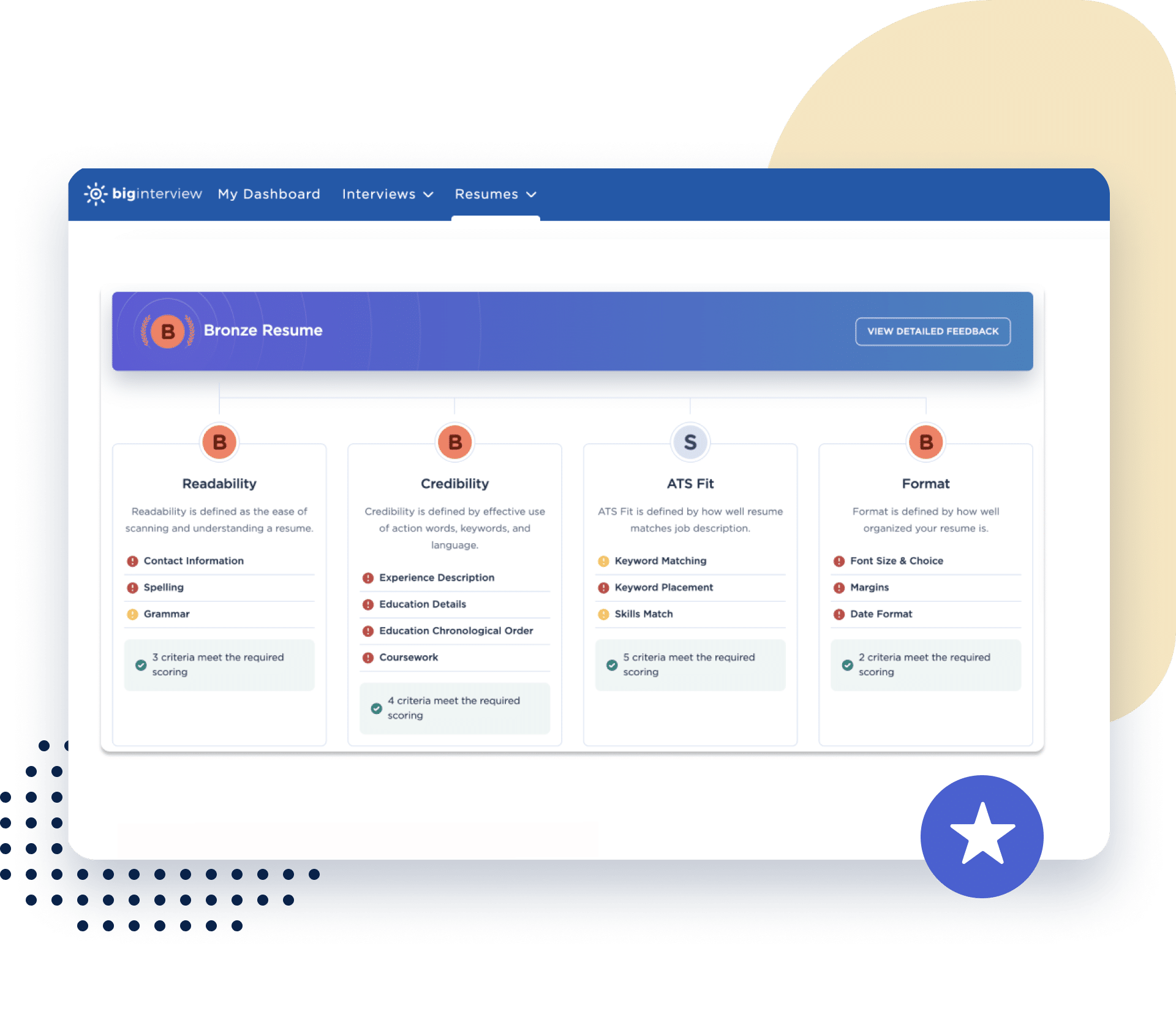
What Are Hard Skills?
Hard skills are skills that are measurable and specific to certain roles, industries, and tasks. You usually gain them through professional experience, education, or training.
When reviewing resumes, employers have an ideal candidate profile in mind, and they will look at your skills section to check if you’re a match.
Hard skills vs. soft skills
Professional skills fall into two groups — hard skills (sometimes also called technical skills) and soft skills (interpersonal skills).
The main difference between them is that hard skills are tangible, quantifiable, and teachable. Soft skills, on the other hand, are related to behavior, personality, and how you interact with other people.
For example, a Project Manager needs these hard skills: Agile, Scrum, Waterfall, PMP, software like Jira, Confluence or Kanban boards, and budget management.
At the same time, to thrive in the role, they need soft skills like great communication with stakeholders, deadline management, cultural proficiency, and the ability to adapt quickly to timeline or project changes.
Both types of skills are relevant to your career — a balance of hard and soft skills will make you a well-rounded professional.
For more info on hard vs. soft skills, check out this guide on Skills to Put on a Resume.
How to Identify Hard Skills for Your Resume
To best showcase your top hard skills on a resume, it’s not enough to pack 3–4 random skills in a separate resume section and leave it at that.
There’s a better approach that will increase your chances of passing the bot resume screening (more about this later) and get invited to the interview.
Identify which hard skills are needed
It’s important to consider what hard skills the employer will be looking for.
If you can’t find them in the job ad, you can predict the hard skills you will need by looking at lists of the most in-demand hard skills for your role.
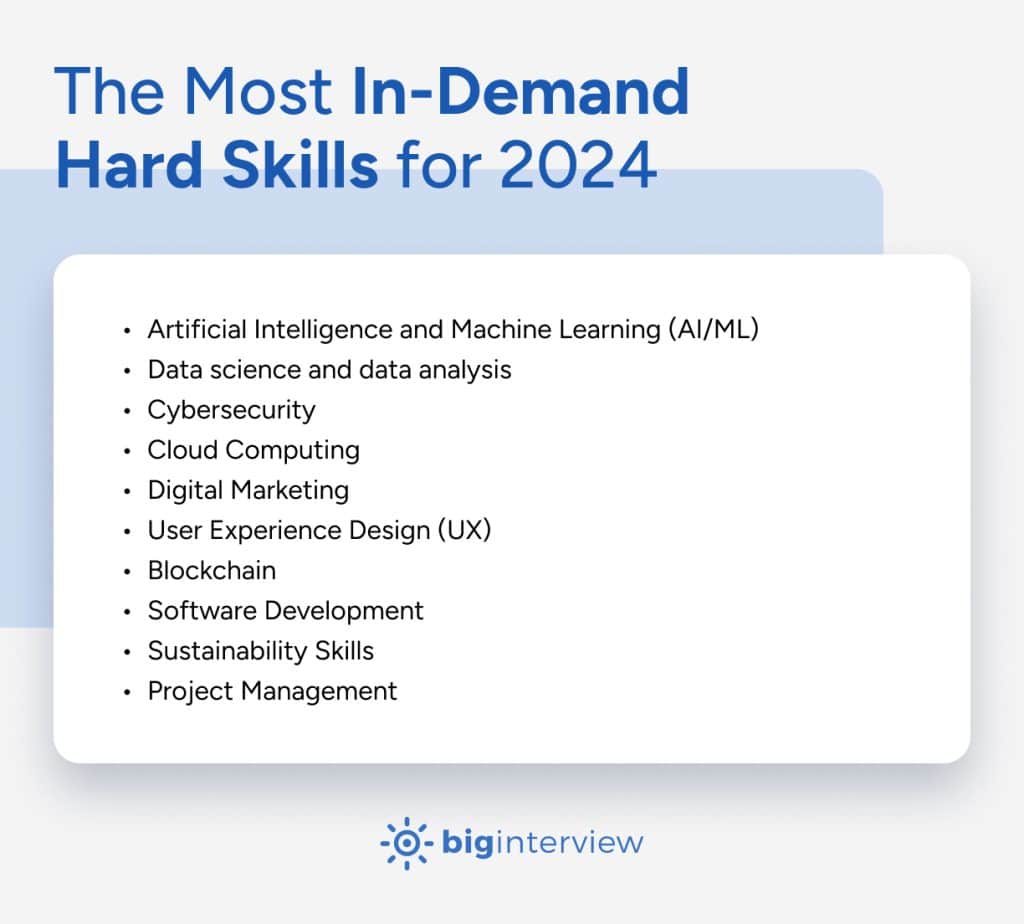
💡Pro tip: List only those skills you genuinely have. You can easily be caught lying — you’ll need to discuss and demonstrate the skills in a test or in the interview.
Make a list of all of your key hard skills
Ideally, as you progress in your career, you’ll list all new skills you acquire, and have the list ready and up-to-date.
If that’s not the case, you can follow these steps to come up with the list:
- List the skills you rely on to complete your past and current job responsibilities.
- List any training or certifications.
- Go through multiple job descriptions for your role and list the skills they’re looking for.
- List the tools, technologies, and methodologies you use in projects or daily tasks.
- If you’re not sure, ask for feedback from coworkers, supervisors, and mentors.
- Explore online skills inventories or lists specific to your industry or role (O*Net is a great place to start).
- Use AI tools like ChatGPT to ask about the relevant skills for your role.
Match your hard skills to the ones listed in the job ad
If you read the job description carefully, you’ll spot the key skills throughout.
For instance, if you’re a Frontend Engineer, you may come across “React,” “JavaScript,” “TypeScript,” “HTML,” and “CSS” or, even more detailed, “Redux and a side effect managing library like Redux-Saga,” “testing frameworks like Jest,” and “proficiency in English.”
When you have a list of skills ready, cross-reference it with your own experiences to identify matches. You can also ask a coworker or a former manager to review it.
💡Pro tip: When a job posting lists specific skills as a requirement, list them on your resume too (if you have them). Otherwise, the ATS may disqualify your application.
Examples of Hard Skills for a Resume for Different Industries
Here are the top resume hard skills examples to strengthen your resume:
Hard skills for software developers
- HTML
- CSS
- JavaScript
- Node.js
- Django
- Flask
- Spring Boot
- Python
- Java
- React
- Angular
- Vue.js
- Elasticsearch
- Git
- MongoDB
- Cassandra
- MySQL
- PostgreSQL
- SQL Server
- Visual Studio Code
- IntelliJ IDEA
- Eclipse
- Maven
- Gradle
- Jenkins
- Gitlab CI/CD
- APIs
- Software revision control systems
- Development and web architecture frameworks
- iOS and Android app development
Check out this guide on how to create a resume template for software engineers, data scientists and web developers: Free Resume Examples.
Hard skills for data analysis
- Data visualization
- Miro
- Python
- R
- MySQL
- PostgreSQL
- Matplotlib
- Seaborn
- ggplot2
- Machine learning
- Big data
- Apache Hadoop
- Apache Spark
- Advanced Excel
- Amazon Redshift
- Google BigQuery
- Snowflake
- Jupyter Notebooks
- Markdown
- Tableau
Hard skills for cyber security
- Cloud security
- On-premises security
- Endpoint security
- Firewalls
- Incident response management
- SOC
- Penetration testing
- Governance, Risk, and Compliance (GRC)
- AWS EKS
- Azure AKS
- GCP GKE
- Kubernetes
- DevSecOps
Hard skills for customer service
- Active listening
- Knowledge of customer service software (like Zendesk or Freshdesk)
- Multilingual customer support
- Problem-solving
- CRM systems
- HubSpot
- Salesforce
- Zoho
- Zendesk
- Freshdesk
- Jira
- Round Robin
- Writing knowledge base articles
- Intercom
- Hootsuite
- TeamViewer
Hard skills for sales
- Cold calling
- CRM software
- HubSpot
- Salesforce
- Zoho
- Prospecting
- lemlist
- Smart Lead
- Instantly
- Woodpecker
- Outreach.io
- Data enrichment tools
- Cognism
- Zoominfo
- Apollo.io
- LinkedIn Bots
- Sales Navigator
- Phantom Buster
- Seamless.AI
- B2B/B2C sales expertise
- Market research and analysis
- Sales presentation and pitching
- Sales funnel management
Hard skills for teaching and education
- Instructional design
- Differentiated Instruction
- Curriculum development
- Mastery of subject matter
- Blackboard
- Canvas
- Edmodo
- Moodle
- YouTube
- Google Meet
- Zoom
- Online collaboration tools
- Classcraft
- Virtual whiteboards
Hard skills for business and finance
- Financial reporting
- Quickbooks
- Xero
- SAP ERP
- Economic forecasting
- Auditing
- Regulatory compliance
- Risk Management
- Proficiency in MS Excel
- Financial modeling
- Bloomberg Terminal
- FactSet
- Morningstar Direct
- Aladdin
- Adaptive Insights
- Anaplan
- IBM Planning Analytics
- Tax Software
- CFA
- CPA
Hard skills for design
- Graphic user interfaces (GUI)
- User research
- User experience
- User interface design
- User testing
- Concepting
- Wireframing
- Prototyping
- Typesetting
- Figma
- Adobe XD
- Photoshop
- Canva
- Adobe Illustrator
- Adobe InDesign
Hard skills for marketing
- SEO and SEM
- HubSpot
- Marketing Funnel Optimization
- Lead scoring
- Lead nurturing
- Google Analytics
- Ahrefs
- SEMRush
- ChatGPT
- Byword
- Copywriting
- Newsletters
- Lead generation
- Email marketing software
- Social media management
- Content Strategy
- Canva
- Video editing
Hard skills for healthcare
- Clinical knowledge
- Equipment handling
- Triage and emergency assessment
- Medical report management
- EHR software
- Epic
- Cerner
- HIPAA knowledge
- CPR and first aid
- Urgent care
- Monitoring vital signs
- Medical treatment administration
- Interpreting lab results and medical charts
- Advising patients on medical treatment
- EMRs system proficiency
Hard skills for administrative roles
- Office management
- Bookkeeping
- Proficiency in Microsoft Office Suite
- Database management
- Typing speed (wpm)
- Scheduling and calendar management
- Google Cloud Platform
- Monday.com
- Notion
- Supply management
- Customer service
- Reporting
- Travel arrangements
- File management
- Correspondence
💡Pro tip: Your skill set may evolve over time, so revisit and update your list regularly.
Remember how we said ATS can disqualify you unless you put the right hard skills in your resume? Here’s more detail from our Chief Coach, Pamela Skillings.
Many ATS systems are trained to look for specific skills when evaluating whether a resume is a “match” for the position. Analyze the job description to identify which hard skills seem most important for the best jobs. Focus on those listed first under requirements or repeated throughout the requirements and job responsibilities sections. You can also use a tool like Big Interview’s Resume AI to compare your resume with a specific job description and identify how well optimized you are, then suggest what to add to increase your chances of scoring a match with the ATS.
Human screeners also scan resumes for critical hard skills. Even if the company does not use ATS algorithms to screen resumes, you will have more success landing interviews if you ensure you feature the right hard skills in your resume.
How to List and Highlight Your Hard Skills (Samples Included)
There are 3 places where you can highlight your hard skills (but also soft skills):
- Add a separate Skills section
- Weave your hard skills in the Work Experience section
- Include them in your resume summary or resume objective
How to list your hard skills in a separate section
When listing hard skills for a resume, you should place them in a separate resume section.
One way to do this is to create a sidebar on the left hand side of your resume document. Within that sidebar, you should create sections for information like your personal info, skills, or hobbies.
Another way to do it is to place the skills below your work experience section (like in the resume example below).
Within the Skills section, use bullets to list your soft and hard skills.
Here are some real-life examples of listing hard skills in a separate resume section.
Entry-level Customer Support Representative job description
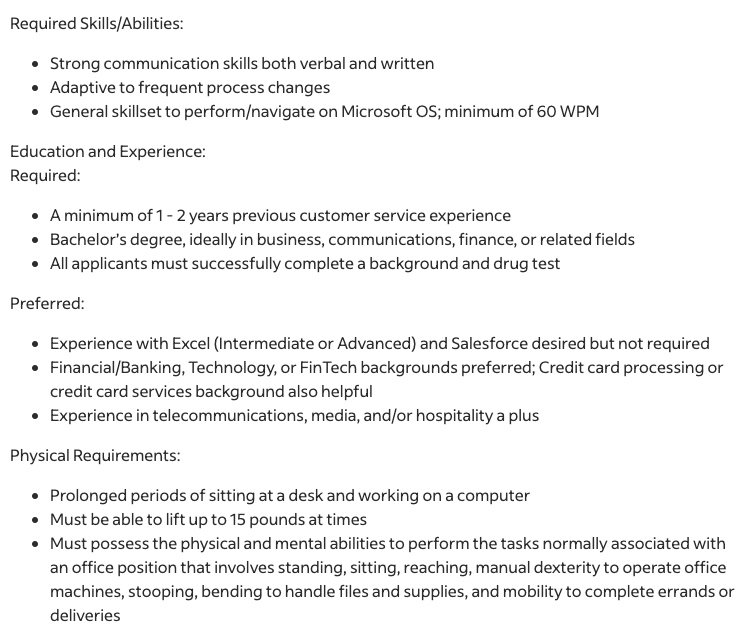
Here’s how an ideal candidate would present hard skills for this particular role:
Sample hard skills list for an entry-level CSR role
- Detail oriented
- Problem-solving skills
- MS Office suite
- Advanced Excel skills
- Tech-savvy
- Fast typing (70 WPM)
- Strong verbal and written communication skills
- Ability to explain complex information clearly
Experienced Project Manager job description
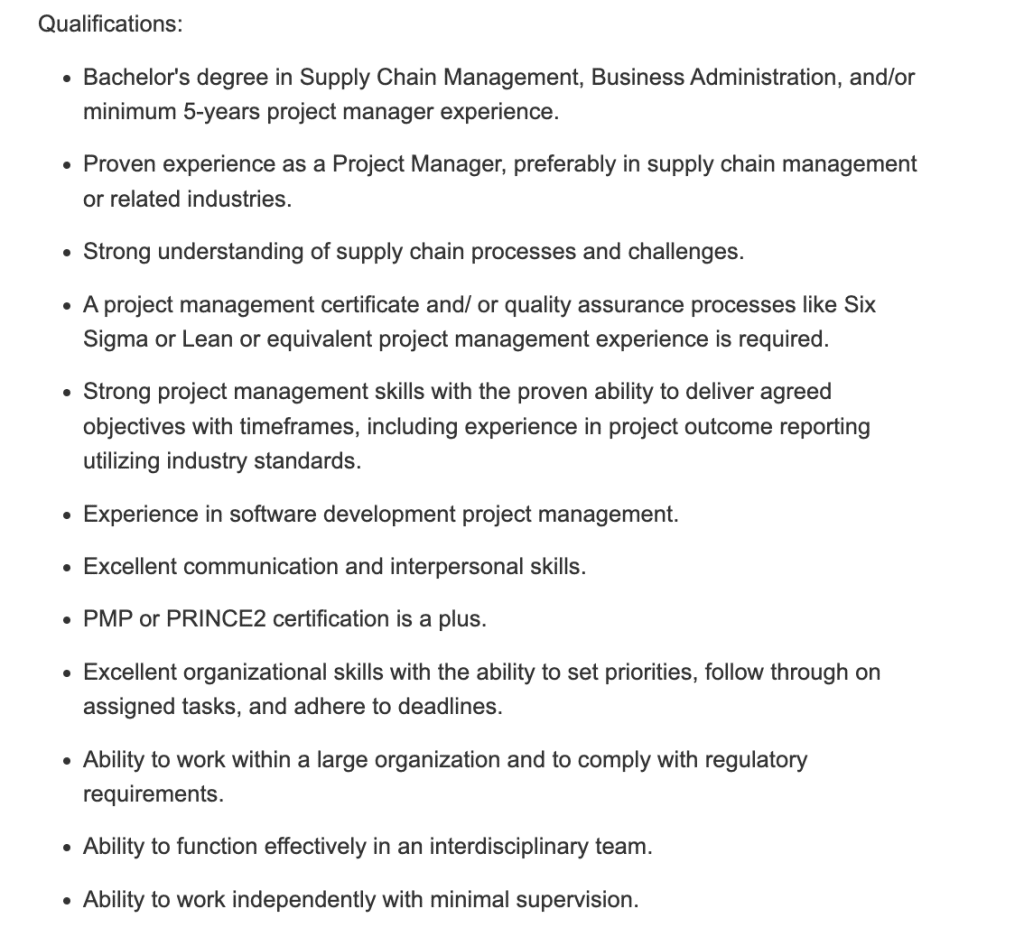
A resume that will get past the AST software and catch the recruiter’s attention features hard skills in the following way:
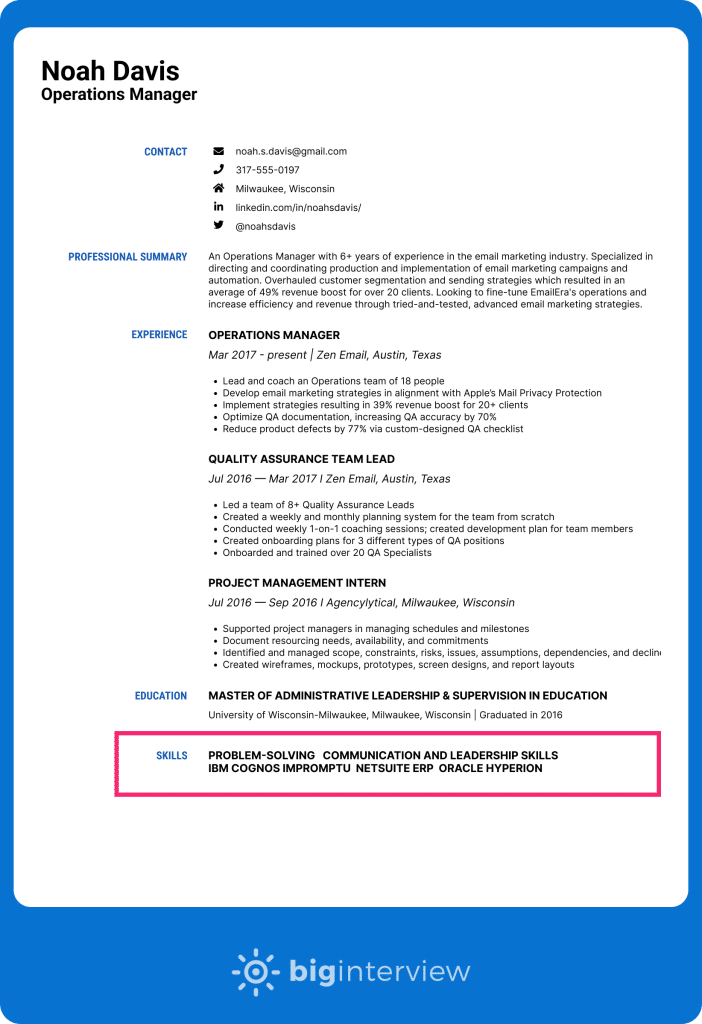
Sample hard skills list for a mid-level Project Management role
- Proficient in Agile and Waterfall
- Expert-level Jira, Microsoft Project, and Trello
- Prince2 certification
- Demonstrated knowledge in supply chain processes, logistics, procurement, and inventory management
- Understanding of business operations, financial management, and strategic planning
- Excellent written and verbal communication skills
- Ability to assess, manage, and mitigate risks
- Strong ability to organize, prioritize, and manage multiple tasks and projects simultaneously
Why we like it:
Both applicants wrote their hard-skill section based on the job description, which ensured better alignment with job expectations and requirements. They also used targeted keywords that make it easier for the ATS (and recruiters) to scan their resume. In both examples, the separate hard-skills section acts like a sneak peek into the applicants’ qualifications and expertise so that the hiring manager can quickly spot if they’re the right fit for the role.
How to weave your skills into your work experience section
To reinforce hard skills most relevant to the position you’re applying for, you should also include them in your work experience section.
If you do this, you’ll need to prove each hard skill with concrete examples.
For example, as a Blog Writer, you need to know about keyword placement, meta title character limits, WordPress, Grammarly, or AI tools like ChatGPT and Byword.
You can weave that into your work experience section like this:
- Wrote 30 low-intent articles in Q1 as part of a progressive SEO project with Byword and ChatGPT.
- Formatted articles in WordPress, paying attention to code best practices.
- Hit 95% grammatical and stylistic accuracy in Grammarly.
Let’s use the same job descriptions from earlier to show how to highlight and provide more context to your hard skills by incorporating them into the work experience section.
Hard skills highlighted on an entry-level customer support agent work history entry
Volunteer Manager
Happy Paws Sanctuary
August 2022 — Present
- Ran newsletters and social media campaigns that increased community awareness and engagement, contributing to a 20% increase in event attendance and a 25% boost in volunteer signups.
- Demonstrated exceptional data entry skills with a typing speed of over 60 WPM, accurately managing the shelter’s database, including donor information and volunteer records.
- Took part in organizing a fundraising campaign that generated over $10,000, enhancing the shelter’s ability to serve the community.
- Gained valuable experience in nonprofit management, customer service, and operational logistics, demonstrating a strong foundation in skills transferable to professional environments.
Hard skills highlighted on an experienced project manager work history entry
Senior Project Manager
CliqIT Logistics
January 2020—Present
- Led a team of 10 in streamlining supply chain processes, achieving a 20% reduction in delivery times and a 15% cost saving by implementing Lean methodologies and quality processes.
- Managed over 30 cross-functional projects from inception to closure, consistently delivering within scope and budget and achieving a 25% improvement in project delivery timelines.
- Launched a digital transformation initiative, overseeing the software development lifecycle and introducing Agile methodologies.
- Created detailed project reports using MS Project and Jira, enhancing project visibility and stakeholder communication, leading to a 30% increase in stakeholder satisfaction.
Why we like it:
Both examples are very specific and detail how the candidate implemented relevant hard skills and improved some critical tasks and operations. By quantifying their achievements, these applicants show exactly how they can contribute to the prospective companies.
If you’re unsure how to structure your work experience section, check out this guide: Work Experience on a Resume: 20+ Examples of How to List It
How to make your skills pop in your resume summary or objective
You should sprinkle your hard skills throughout your resume, including the summary and objective.
Take a look at this example:
Senior product designer with 8+ years of experience working with Fortune 2000 clients including Red Bull and Lufthansa. Skilled in user experience, user interface design, information architecture, wireframing, and strategy. Currently leading a multidisciplinary team of 8 in charge of developing and testing layouts, interfaces, and functionalities. Proficient in user research, prototyping, concepting, Figma, Notion, HTML, and CSS.
Here are some more samples to use as inspiration:
Hard skills in an entry-level customer support representative resume objective or resume summary
Resume summary
Flexible and detail-oriented professional with a strong community outreach and customer service background, including volunteer coordination and data management skills honed at a local community shelter. Adept at improving operational efficiencies and enhancing customer engagement through effective communication and problem-solving. Adaptable and proficient in Microsoft Office with a proven ability to multitask.
Resume objective
Dedicated and efficient professional seeking a customer support role at GreenLite, where my proven communication skills, Microsoft Office proficiency, and experience in high-pressure environments can enhance customer satisfaction and service excellence.
Hard skills in a project manager resume objective or resume summary
Resume summary
Result-oriented project manager with 8+ years of experience and a proven track record of leading and delivering high-impact supply chain and IT projects on time and within budget. Skilled in streamlining supply chain processes, initiating agile transformations, and creating detailed project reports. Recognized for increasing efficiency, mitigating risks, enhancing stakeholder satisfaction, and fostering a culture of continuous improvement.
Resume objective
Resourceful and analytical Project Manager with Prince2 certification, ready to apply expertise in supply chain management and Agile methodologies to help ByteCh achieve operational excellence and significant efficiency improvements.
Why we like it:
The examples are short and allow the recruiting managers to see the applicants’ main value prop at a glance. No fluff and irrelevant details — only the essentials that align with the company’s requirements and job descriptions.
Check out our detailed guides on crafting a winning resume summary and resume objective.
Hard Skills for a Resume: Popular Opinion vs. Expert Advice
Time to deconstruct some resume writing advice from online spaces like Reddit, YouTube, or Quora.
Two experts, Big Interview’s co-founder and Chief Career Coach with 15+ years of experience, Pamela Skillings, and Michael Tomaszewski, a Certified Professional Resume Writer, went through some upvoted subreddits to analyze the tips given by the community.
User u/KathyanaH on Reddit says:
Here are some great hard skills to add to your resume right now:
- Research and analysis skills
Data analysis and data collection are really hot skills in the market these days. Mention research, data collection, data analysis, reporting, summarizing, and categorizing in your resume.
- Sales skills
If you are applying for a job in the services sector, this is a must-have skill on your resume. Some keywords you can use are; product knowledge, product development, business communication, sales presentations, and sales demos.
- Tech skills
Technical skills are useful for almost all industries at present. Listing programming, video conferencing, IT optimization, and networking skills on your resume will highlight you.
- Finance skills
The financial skills of candidates help employers make profits. Financial modeling, financial systems, forecasting, and risk analysis are some keywords to incorporate into your resume to emphasize your skills.
Career expert comment:
What’s strange about this post is that it lists hot technical skills for a resume without specifying the roles or industries where these skills would make sense. The skills are generic to the point where I’m 99% sure this was AI-generated.
— Pamela Skillings, Co-Founder and Chief Career Coach at Big Interview
Next, there’s Arslan on Quora on the best hard skills for an entry-level programmer’s resume:
Some examples of hard skills that would look good on a resume for an entry level programmer include:
- Programming languages: Knowledge of programming languages such as Python, Java, C++, or JavaScript.
- Data structures and algorithms: Understanding of fundamental data structures like stacks, queues, and trees, as well as sorting and searching algorithms.
- Object-oriented programming (OOP): Understanding of OOP concepts such as encapsulation, inheritance, and polymorphism.
- Relational databases: Familiarity with SQL and database management systems such as MySQL or PostgreSQL.
- Web development: Knowledge of HTML, CSS, and JavaScript, as well as frameworks such as React or Angular.
- Operating systems: Understanding of operating system concepts like file systems, process management, and memory management.
- Debugging and testing: Ability to debug code and write test cases to ensure code quality.
Career expert comment:
Not a horrible answer but definitely Chat GPT-generated. The structure easily gives it away. Another problem is that when you list your hard skills for a resume, you need to make sure they match your actual skills to those in the job ad. Copying a list like this won’t be helpful at all.
— Michael Tomaszewski, CPRW
Finally, here’s a Reddit tip one Data Analyst got when they asked about the dos and don’ts for the skills section. They noted how they mostly had hard skills and software to list, but were struggling with the number of skills to include and how to format the section.
If you have real technical skills to add or proficiencies in platforms that are required for the job, focus on that. I see people waste this space with soft skills like hard worker, analytical, communication etc. This doesn’t help you. List what’s relevant to the role! You’re basically making it easier for a recruiter to see that you have the necessary software and tech skills needed. And recruiters like finding that info fast.
You can just list them as opposed to a progress bar or rating. Since I’d imagine you either know how to use the tool or you don’t.
Career expert comment:
This Reddit advice is legit. The part where they pointed out that focusing on your actual tech skills is key is spot-on. I agree you should ditch the generic stuff about being a hard worker who is organized and a great team-player. Listing your tech skills straight up without fancy progress bars totally makes sense. It’s all about making it easy for the recruiter and the ATS. Just get to the point.
— Pamela Skillings, Co-Founder and Chief Career Coach at Big Interview
Summary of the Main Points
Here’s a quick recap:
- No resume is complete without a list of skills. Hard skills are especially important because they tell the employer what job or industry-specific knowledge and tools you’re familiar with. This automatically means they’ll spend less time on your onboarding and training.
- Add your hard skills to the Skills section of your resume, but also sprinkle them throughout your work history section and resume summary.
- Use the job description as guidance. The required technical skills will be spelled out in the job ad.
- Customize your skills section based on the job requirements and list only those skills you actually have.
FAQ
How to describe my hard skills if I have no experience and I only know those skills in theory?
If you’re new to the job market and have no experience, you can still list your hard skills on a resume. In the Skills section, list the software, tools, and technologies you’ve learned about. If you took any courses or participated in projects, add them to your Education section to complement and provide evidence for the skills you listed.
What are the most in-demand hard skills in 2024?
According to a recent report from LinkedIn Learning, the most in-demand hard skills in 2024 include Artificial Intelligence (AI) and Machine Learning (ML), data analysis, coding and programming, cloud computing, cybersecurity, sustainability, and project management.
Are hard skills on a resume more important than soft skills?
This depends on the role and the industry. For engineering and technical roles, hard skills are critical and may carry more weight. Many employers choose candidates who are also a “cultural fit,” and may prioritize soft skills because they contribute to a positive work environment and better collaboration. Soft skills are more significant in leadership or managerial positions where the ability to motivate, collaborate, and resolve conflict effectively is crucial.
What are some universal hard skills I should learn?
There are some general hard skills that are useful in many roles and industries. You should be comfortable using MS Excel, Google Docs, and other similar word processing, spreadsheets, and presentation tools. Video conferencing tools like Google Meet or Zoom, social media management, as well as project management methodologies like Agile or Scrum can also be useful.
Are “technical skills” and “hard skills” the same?
“Technical skills” and “hard skills” are often used to mean the same, but there is a slight difference in meaning. Technical skills are a subset of hard skills and refer to skills related to technology or a specific area of expertise. Hard skills are broader and usually include technical skills. For instance, project management (hard skill) includes the knowledge of PM tools like Monday.com (technical skill), as well as some general project management frameworks (still a “hard” skill, not necessarily technical).
